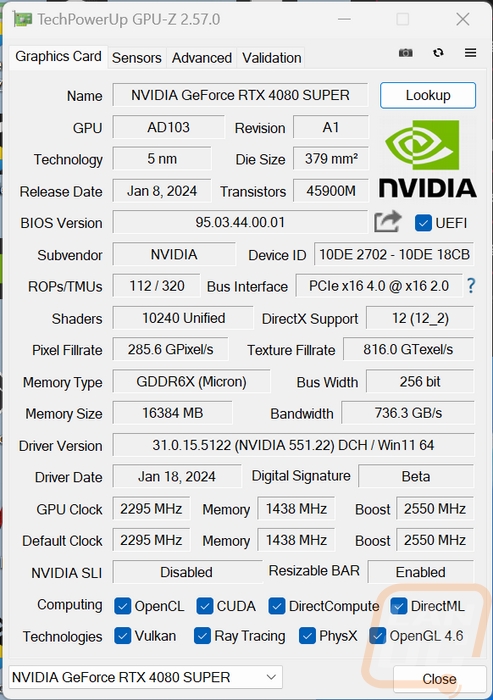With Nvidia’s CES announcements, they announced three different GPUs all with the previously used SUPER designation. I took a look at the RTX 4070 SUPER as well as the RTX 4070 Ti SUPER but the crown jewel in all of this was of course the RTX 4080 SUPER. The RTX 4090 is still the flagship GPU from Nvidia nothing has changed there, but the RTX 4080 has always really been the gaming flagship with the RTX 4090 being there for people who want to show off and anyone who needs mind-blowing compute performance. So the introduction of the RTX 4080 SUPER was an exciting one especially with the new model coming in $200 less than the RTX 4080’s launch price which was a point of contention for a lot of people at its launch. So today I’m excited to dig in and see what sets the Nvidia RTX 4090 SUPER Founders Edition apart and see how it performs before we figure out how it fits in the ever-changing GPU market.
Product Name: Nvidia RTX 4080 SUPER Founders Edition
Review Sample Provided by: Nvidia
Written by: Wes Compton
Amazon Affiliate Link: HERE
What’s so SUPER
Nvidia’s CES announcements were all covered in their video but to hit a few highlights before getting into what the three new SUPER cards have to offer. They touched on a few new upcoming RTX supported titles. One of those is Half-Life 2 RTX which was done using the RTX Remix tool. That tool is going into open beta offering an easy way for modders and developers to upgrade past and current games to utilize RTX technology. Anything that makes it easier to do will only help get more support and in this case, we can potentially see upgraded games that we would have never seen otherwise which is exciting.
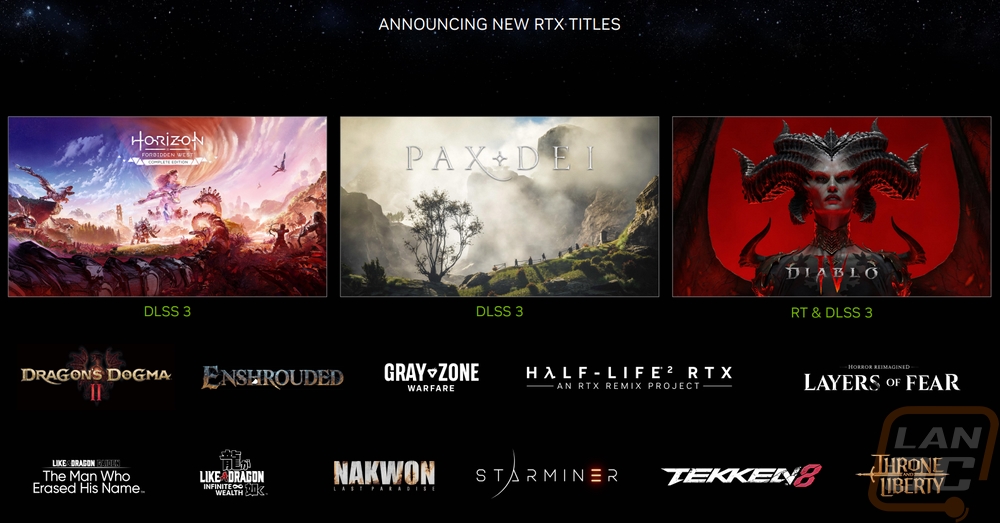
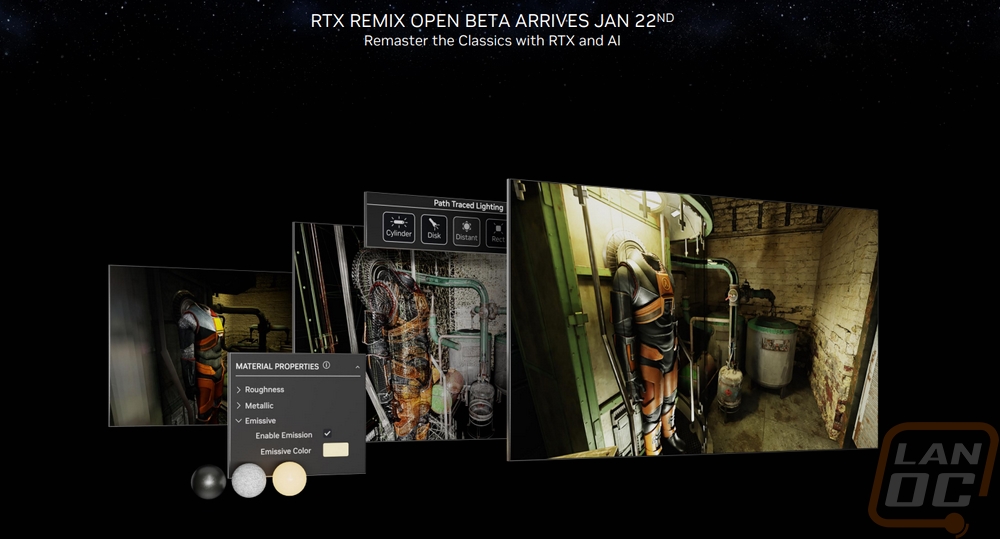
Nvidia and Twitch announced a new way for Twitch streamers to now offer a better range of resolutions. In the past, for anyone who isn’t one of their main partnered streamers you are stuck with just one resolution. This way you will be able to stream at a range of resolutions and frame rates. Viewers who have the bandwidth can enjoy better quality 4k 60 FPS streams but users on mobile or lower-performing internet connections will still be able to watch as well.
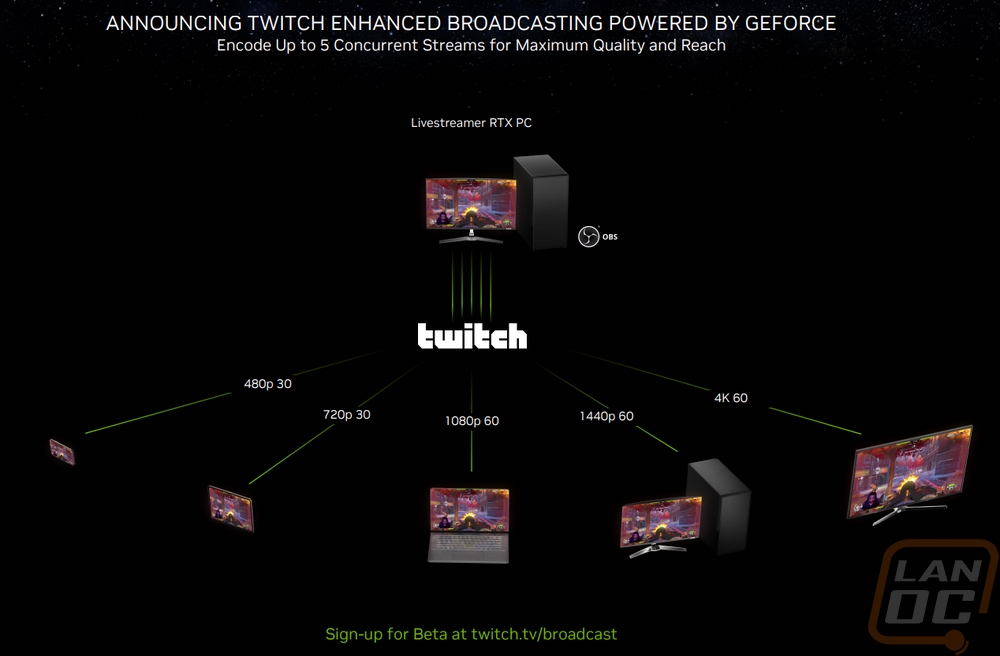
They announced improvements in G-Sync variable refresh rate. Along with that, they covered G-Sync Pulsar which is part of their VRR or variable refresh rate technology. Pulsar bridges the gap between using variable refresh rate and ultra low motion blur to get a smooth experience but cut out the blur that you can get with it.
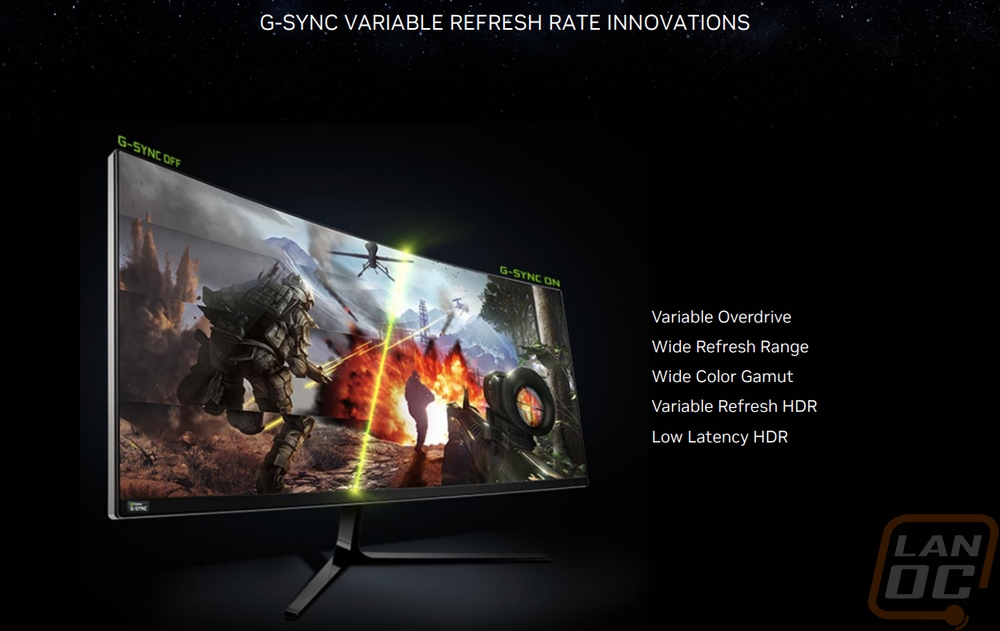
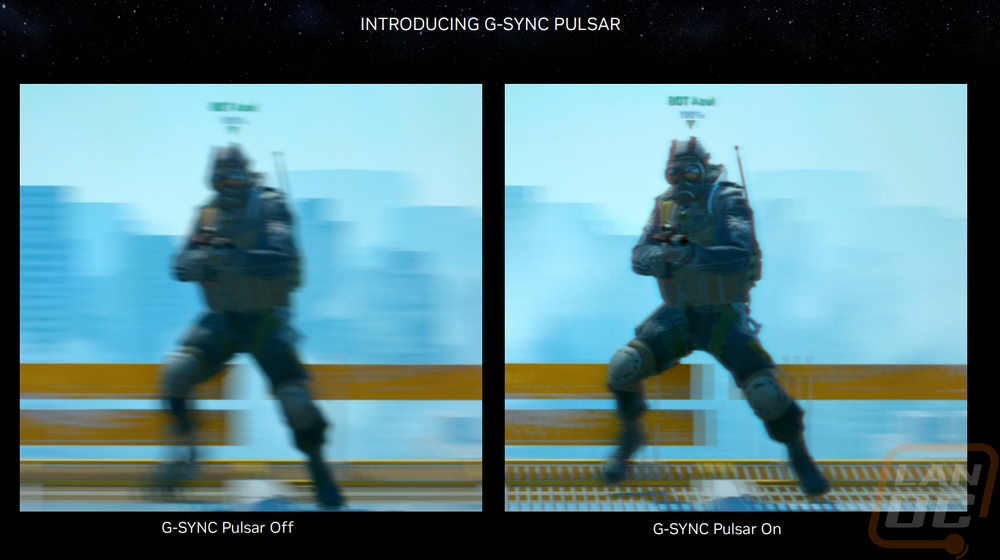
They then of course announced the three new SUPER cards and showed where all three will fit in their updated lineup. The RTX 4080 SUPER will replace the RTX 4080 and sit behind the RTX 4090 still. That will have an MSRP of $999, $200 less than the original MSRP of the RTX 4080. The new card has a faster base clock of 2295 MHz vs 2205 MHz on the 4080 and 40 MHz more on the boost clock with it now at 2550 MHz. The real improvement comes from more cores going from 9728 CUDA cores up to 10240. The RTX 4070 Ti SUPER replaces the RTX 4070 and has an MSRP of $799, the same as the original launch price of the RTX 4070. It gets a memory clock speed improvement but like with the 4080 SUPER, it's big improvements with the CUDA core count jumping up from 7680 up to 8448 which is a big improvement. With all of these cards, the tensor cores and RT cores will also scale up at the same rate as the CUDA cores as well. Lastly the RTX 4070 SUPER doesn’t replace the original RTX 4070, the original is staying in the lineup. The 4070 will now be $549, $50 less than its launch price and the RTX 4070 SUPER takes up that $599 price point and fits in between the 4070 and 4070 Ti SUPER. The CUDA core count goes from 5888 up to 7168, a 21.7% improvement and the same boost and memory clock speeds. Nvidia did bump up the power usage slightly with the 4070 SUPER now having a TGP of 220 Watts to the 200 Watts on the 4070, the 4080 SUPER and 4070 Ti SUPER both stay the same at 285 Watts and 320 watts respectively. Overall though I like that as a refresh the focus is on adding more cores, not cranking up clock speeds which we have seen with things like the RX 480 to RX 580.
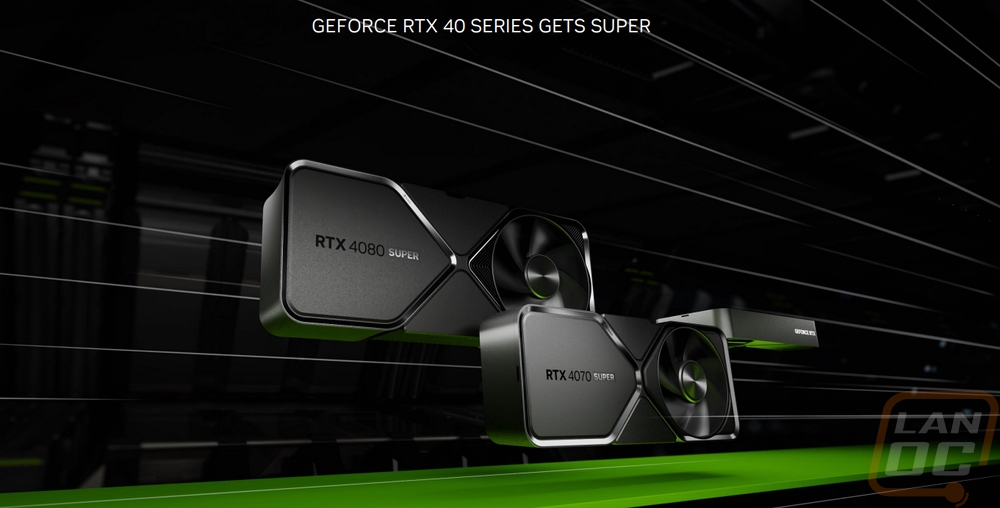
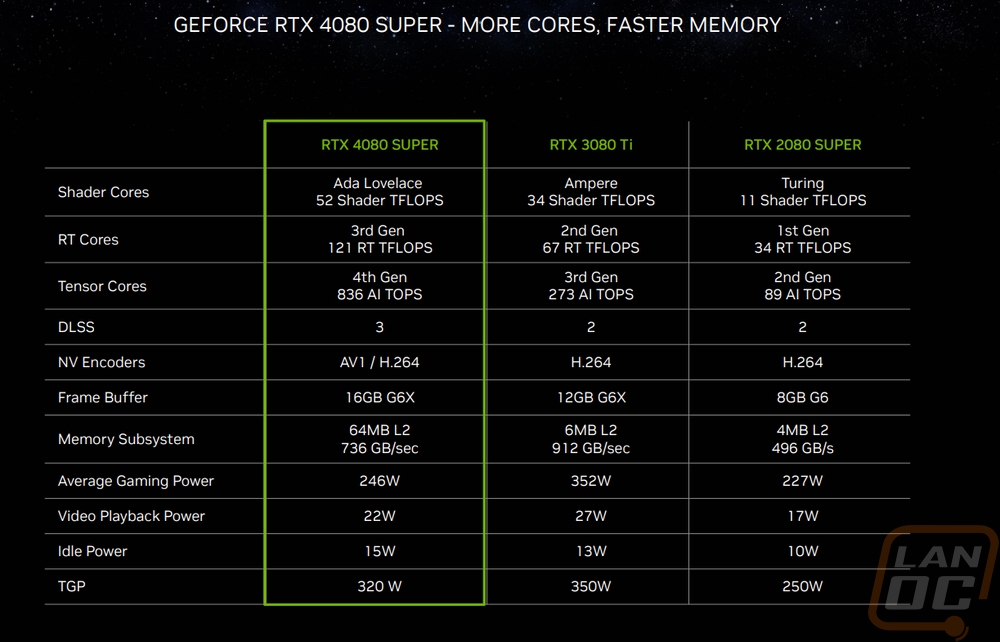
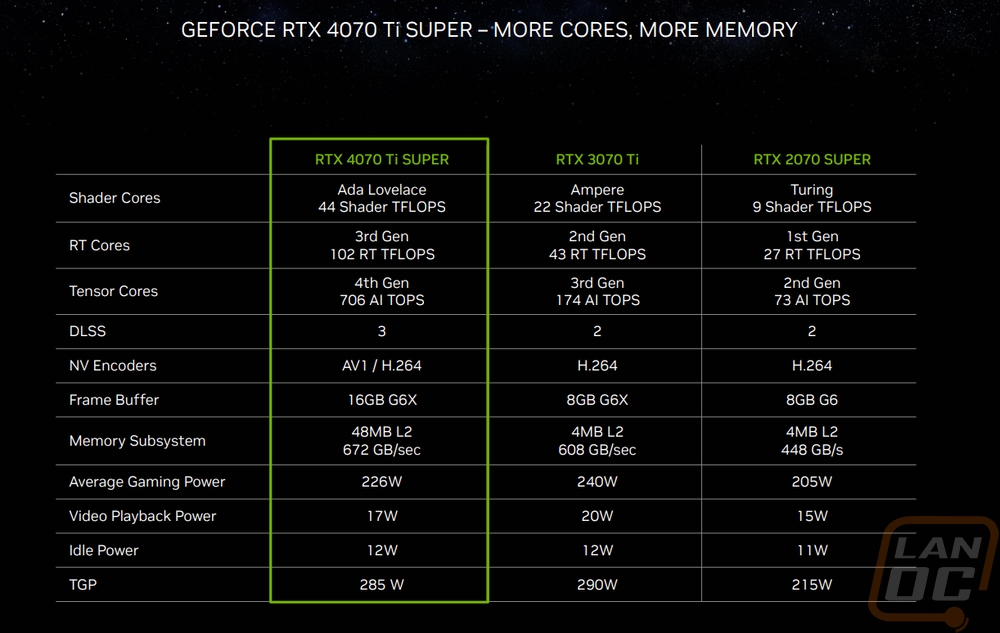
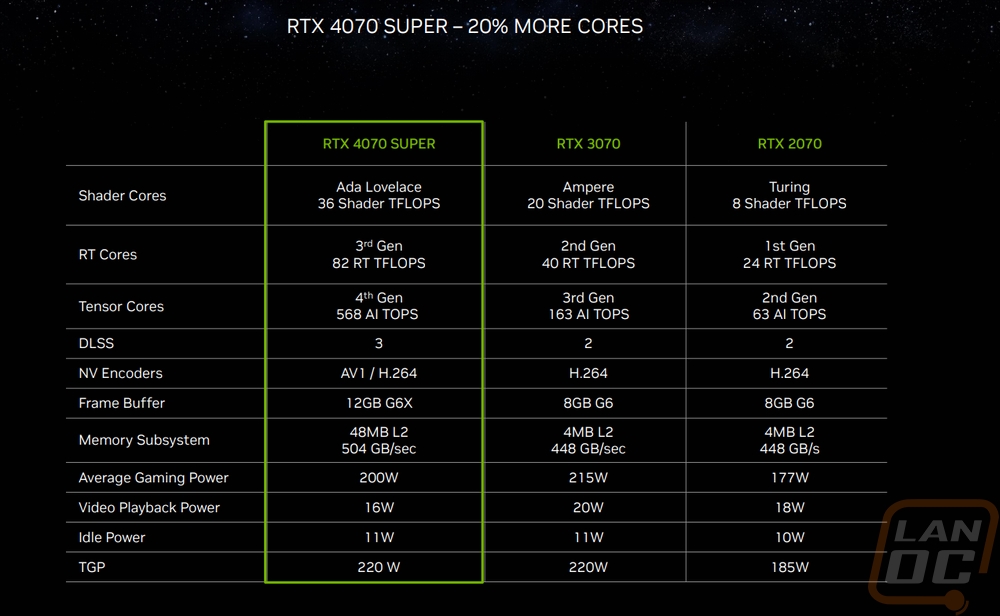
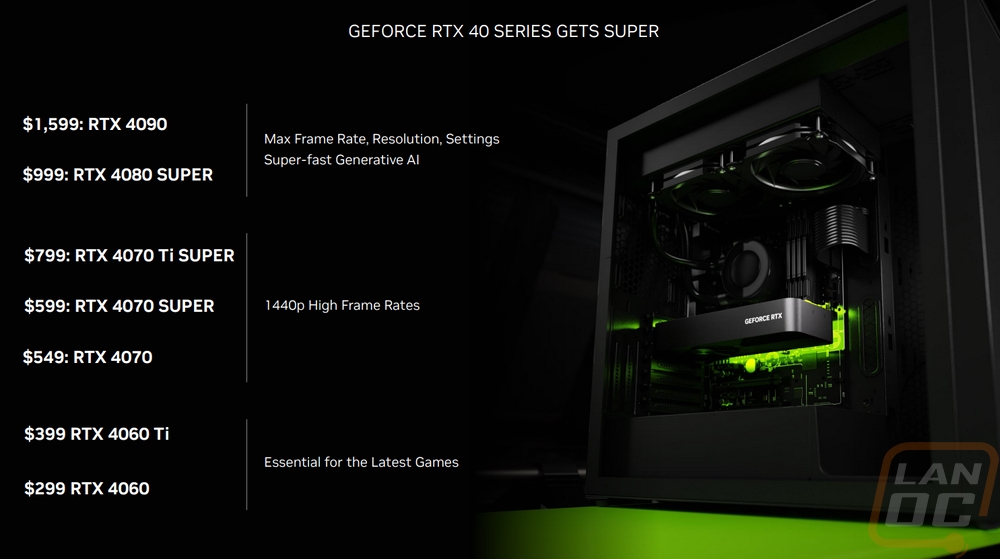
|
Specifications |
RTX 4070 Ti SUPER |
RTX 4080 |
RTX 4080 SUPER |
RTX 4090 |
|
Graphics Processing Clusters |
6 |
7 |
7 |
11 |
|
Texture Processing Clusters |
33 |
38 |
40 |
64 |
|
Streaming Multiprocessors |
66 |
76 |
80 |
128 |
|
CUDA Cores |
8448 |
9728 |
10240 |
16384 |
|
Tensor Cores |
264 (4th Gen) |
304 (4th Gen) |
320 (4th Gen) |
512 (4th Gen) |
|
RT Cores |
66 (3rd Gen) |
76 (3rd Gen) |
80 (3rd Gen) |
128 (3rd Gen) |
|
Texture Units |
264 |
304 |
320 |
512 |
|
ROPs |
96 |
112 |
112 |
176 |
|
Boost Clock |
2610 MHz |
2505 MHz |
2295 MHz |
2520 MHz |
|
Memory Clock |
1313 MHz |
1400 MHz |
1438 MHz |
1313 MHz |
|
Memory Data Rate |
21 Gbps |
22.4 Gbps |
23 Gbps |
21 Gbps |
|
L2 Cache Size |
48 MB |
64 MB |
64 MB |
72 MB |
|
Total Video Memory |
16 GB GDDR6X |
16 GB GDDR6X |
16 GB GDDR6X |
24 GB GDDR6X |
|
Memory Interface |
256-bit |
256-bit |
256-bit |
384-bit |
|
Total Memory Bandwidth |
672 GB/sec |
1008 GB/sec |
736 GB/s |
1008 GB/s |
|
Texture Rate (Bilinear) |
689 GigaTexels/second |
761.5 GigaTexels/second |
816 GigaTexels/second |
1290.2 GigaTexels/second |
|
Fabrication Process |
4N NVIDIA Custom Process |
TSMC 4N NVIDIA Custom Process |
4N NVIDIA Custom Process |
TSMC 4 nm NVIDIA Custom Process |
|
Transistor Count |
45.9 Billion |
45.9 Billion |
45.9 Billion |
76.3 Billion |
|
Connectors |
3 x DisplayPort 1 x HDMI |
3 x DisplayPort 1 x HDMI |
3 x DisplayPort 1 x HDMI |
3 x DisplayPort 1 x HDMI |
|
Power Connectors |
2x PCIe 8-pin cables (adapter in box) OR 300 W or greater PCIe Gen 5 cable |
3x PCIe 8-pin cables (adapter in box) OR 1x 450 W or greater PCIe Gen 5 cable |
3x PCIe 8-pin cables (adapter in box) OR 450 W or greater PCIe Gen 5 cable |
3x PCIe 8-pin cables (adapter in box) OR 450 W or greater PCIe Gen 5 cable |
|
Minimum Power Supply |
700 Watts |
750 Watts |
750 Watts |
850 Watts |
|
Total Graphics Power (TGP) |
285 Watts |
320 Watts |
320 Watts |
450 Watts |
|
Maximum GPU Temperature |
90° C |
90° C |
90° C |
90° C |
|
PCI Express Interface |
Gen 4 |
Gen 4 |
Gen 4 |
Gen 4 |
|
Launch MSRP |
$799 |
$1199 |
$999 |
$1599 |
Before getting into testing I also ran GPUz to double-check that our clock speeds match up with the specifications. In this case, the RTX 4080 SUPER Founders Edition is of course the stock clocks but I did want to double check to make sure. GPUz also documents the driver used for testing which is 551.22 and the BIOS version as well in case that is needed in the future.
